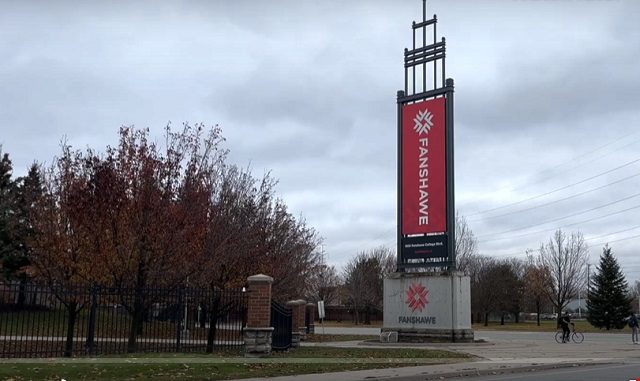COVID-19
College’s COVID vaccine mandate for remote professor was ‘not reasonable,’ arbitrator rules

From LifeSiteNews
Arbitrator Larry Steinberg determined that Fanshawe College erred in mandating that Professor Andrew Wing have the shots as a condition of work despite working from home.
An Ontario arbitrator ruled in favor of a vaccine-free professor who was put on unpaid leave for refusing to comply with his college’s COVID jab policy despite working from home, concluding that the college’s jab mandate was “not reasonable.”
Arbitrator Larry Steinberg, in a ruling released February 20, determined that Fanshawe College, an applied arts college in London, Ontario, erred in mandating that Professor Andrew Wing have the shots as a condition of work despite working from home.
“This case is not about whether the vaccination Policy of the College is reasonable. This case is more narrowly focused only on whether, based on the evidence before me, it was reasonable to apply the Policy to the grievor in the context of his working conditions at the time,” Steinberg wrote in his ruling.
“I find that requiring the grievor to comply with the vaccination Policy was not reasonable and the grievance is allowed. As requested by the parties the issue of the appropriate remedy is remitted to the parties.”
Wing holds a full-time position in the Technical Systems Analysis (TSS) program within the School of Information Technology. All of its classes are remote.
Fanshawe College, like most in Ontario, in November 2021 set mandatory COVID jab policies for staff and students to comply with a provincial government dictate, which was announced a few months earlier. Those that did not comply were fired or placed on unpaid leave.
Wing told the college that he was not going to get the COVID shots and wanted an exemption under Ontario’s Human Rights Code. He was subsequently placed on a three-month leave with no pay that started January 3, 2022.
Wing was not happy with being put on unpaid leave, and with the help of the Ontario Public Service Employees Union Local 110, filed a grievance.
The grievance read, “I grieve that Fanshawe has unreasonably applied its COVID-19 Vaccination policy and as a result has threatened an unreasonable disciplinary action under our Collective Agreement and/or any applicable statues, and in so doing, has violated Articles 4 and 31 of the Collective Agreement along with any other relevant articles and/or laws.”
Wing’s union, as per the arbitrator’s ruling, noted that “There was no credible justification given for the rule requiring that the grievor be fully vaccinated in view of the fact that his work requirements had been and continued to be done remotely.”
Fanshawe College argued that the “policy that everyone who attended on campus had to be fully vaccinated never changed from its inception.”
The college’s human resources department had argued, as per the arbitrator’s ruling, that it was an “administrative burden for the employer to continue to have to check the vaccination status of employees who found it necessary to be on campuses,” and that, “In the grievor’s case this could include meeting with students, attending to technical matters and attending at meetings.”
Steinberg ruled that regarding the human resources department’s claim, “There was no evidence why the grievor could not continue to perform all of these functions remotely as had been since the inception of the program in 2020.”
“I reject this evidence as in any way justifying the requirement that the grievor be vaccinated on the basis of the College’s interest in carrying out its responsibilities,” he wrote.
As for Wing returning to work, in March 2022, he got an email from the college that because he was working remotely he could come back to remote work with pay.
Fanshawe College, like many universities and post-secondary institutions in the Ontario, had in place a COVID jab mandate policy for staff and students that targeted the vaccine-free.
Ontario’s government, under pro-mandate and pro-lockdown Premier Doug Ford, for a time mandated not only mask-wearing, but COVID shots for workers in healthcare and other government settings.
The mandates led to lawsuits against governments and universities and other businesses Canada-wide.
Many institutions along with governments in Canada rescinded vaccine mandates and vaccine passports last year, but not after causing much harm to the unjabbed.
LifeSiteNews has reported on many cases that Canadian arbitrators ruled in favor of the vaccine-free who lost work for not getting the shots.
When it comes to the shots themselves, there is a large body of data showing that COVID jab mandates and passports have been failed strategy for tackling COVID, not to mention the fact that the jabs have been linked to millions of injuries and thousands of deaths.
It is now understood that the COVID virus has a minimal risk of asymptomatic spread, and research indicates that natural immunity from infection of COVID is far superior to vaccine-induced immunity.
2025 Federal Election
Conservatives promise to ban firing of Canadian federal workers based on COVID jab status

From LifeSiteNews
The Conservative platform also vows that the party will oppose mandatory digital ID systems and a central bank digital currency if elected.
Pierre Poilievre’s Conservative Party’s 2025 election platform includes a promise to “ban” the firing of any federal worker based “solely” on whether or not they chose to get the COVID shots.
On page 23 of the “Canada First – For A Change” plan, which was released on Tuesday, the promise to protect un-jabbed federal workers is mentioned under “Protect Personal Autonomy, Privacy, and Data Security.”
It promises that a Conservative government will “Ban the dismissal of federal workers based solely on COVID vaccine status.”
The Conservative Party also promises to “Oppose any move toward mandatory digital ID systems” as well as “Prohibit the Bank of Canada from developing or implementing a central bank digital currency.”
In October 2021, the Liberal government of former Prime Minister Justin Trudeau announced unprecedented COVID-19 jab mandates for all federal workers and those in the transportation sector. The government also announced that the unjabbed would no longer be able to travel by air, boat, or train, both domestically and internationally.
This policy resulted in thousands losing their jobs or being placed on leave for non-compliance. It also trapped “unvaccinated” Canadians in the country.
COVID jab mandates, which also came from provincial governments with the support of the federal government, split Canadian society. The shots have been linked to a multitude of negative and often severe side effects, such as death, including in children.
Many recent rulings have gone in favor of those who chose not to get the shots and were fired as a result, such as an arbitrator ruling that one of the nation’s leading hospitals in Ontario must compensate 82 healthcare workers terminated after refusing to get the jabs.
Beyond health concerns, many Canadians, especially Catholics, opposed the injections on moral grounds because of their link to fetal cell lines derived from the tissue of aborted babies.
COVID-19
RFK Jr. Launches Long-Awaited Offensive Against COVID-19 mRNA Shots

 Nicolas Hulscher, MPH
Nicolas Hulscher, MPH
As millions of Americans anxiously await action from the new HHS leadership against the COVID-19 mRNA injections—injected into over 9 million children this year—Robert F. Kennedy Jr. has finally gone publicly on the offensive:
Let’s go over each key point made by RFK Jr.:
The recommendation for children was always dubious. It was dubious because kids had almost no risk for COVID-19. Certain kids that had very profound morbidities may have a slight risk. Most kids don’t.
In the largest review to date on myocarditis following SARS-CoV-2 infection vs. COVID-19 vaccination, Mead et al found that vaccine-induced myocarditis is not only significantly more common but also more severe—particularly in children and young males. Our findings make clear that the risks of the shots overwhelmingly outweigh any theoretical benefit:
The OpenSAFELY study included more than 1 million adolescents and children and found that myocarditis was documented ONLY in COVID-19 vaccinated groups and NOT after COVID-19 infection. There were NO COVID-19-related deaths in any group. A&E attendance and unplanned hospitalization were higher after first vaccination compared to unvaccinated groups:
So why are we giving this to tens of millions of kids when the vaccine itself does have profound risk? We’ve seen huge associations of myocarditis and pericarditis with strokes, with other injuries, with neurological injuries.
The two largest COVID-19 vaccine safety studies ever conducted, involving 99 million (Faksova et al) and 85 million people (Raheleh et al), confirm RFK Jr.’s concerns, documenting significantly increased risks of serious adverse events following vaccination, including:
- Myocarditis (+510% after second dose)
- Acute Disseminated Encephalomyelitis (+278% after first dose)
- Cerebral Venous Sinus Thrombosis (+223% after first dose)
- Guillain-Barré Syndrome (+149% after first dose)
- Heart Attack (+286% after second dose)
- Stroke (+240% after first dose)
- Coronary Artery Disease (+244% after second dose)
- Cardiac Arrhythmia (+199% after first dose)
And this was clear even in the clinical data that came out of Pfizer. There were actually more deaths. There were about 23% more deaths in the vaccine group than the placebo group. We need to ask questions and we need to consult with parents.
Actually, according to the Pfizer’s clinical trial data, there were 43% more deaths in the vaccine group compared to the placebo group when post-unblinding deaths are included:
We need to give people informed consent, and we shouldn’t be making recommendations that are not good for the population.
Public acknowledgment of the grave harms of COVID-19 vaccines signals that real action is right around the corner. However, we must hope that action is taken for ALL age groups, as no one is spared from their life-reducing effects:
Alessandria et al (n=290,727, age > 10 years): People vaccinated with 2 doses lost 37% of life expectancy compared to the unvaccinated population during follow-up.
Epidemiologist and Foundation Administrator, McCullough Foundation
Please consider following both the McCullough Foundation and my personal account on X (formerly Twitter) for further content.
-

 Business2 days ago
Business2 days agoIs Government Inflation Reporting Accurate?
-

 2025 Federal Election2 days ago
2025 Federal Election2 days agoCarney’s Hidden Climate Finance Agenda
-

 2025 Federal Election2 days ago
2025 Federal Election2 days agoWhen it comes to pipelines, Carney’s words flow both ways
-

 2025 Federal Election2 days ago
2025 Federal Election2 days agoStudy links B.C.’s drug policies to more overdoses, but researchers urge caution
-

 2025 Federal Election2 days ago
2025 Federal Election2 days agoPolls say Canadians will give Trump what he wants, a Carney victory.
-

 2025 Federal Election1 day ago
2025 Federal Election1 day agoCarney Liberals pledge to follow ‘gender-based goals analysis’ in all government policy
-

 2025 Federal Election1 day ago
2025 Federal Election1 day agoPoilievre’s Conservatives promise to repeal policy allowing male criminals in female jails
-

 Also Interesting2 days ago
Also Interesting2 days agoIf You Frequently Travel, A Second Phone Number Can Be A Cost Effective Solution












